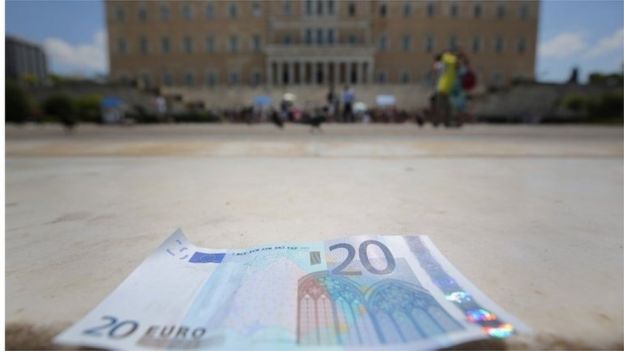 Google
Google
Eurozone finance ministers say they have made progress in talks about the bailout programme for Greece.
But they said after a meeting in Amsterdam on Friday that further work was still needed.
They said they are hopeful that an agreement can reached in the next few days and are ready to call an extraordinary meeting.
That would pave the way for the next payment under the bailout.
It's a familiar pattern.
Once again a review of the Greek government's policies has been delayed by months. So has the next payment of financial assistance.
This review, the first under a new bailout of more than €80bn and agreed in August 2015, was originally supposed to be completed last year.
Positive
The tone emerging from a meeting of eurozone finance ministers was, however, relatively positive. There has been progress, they acknowledged, but they want to see more in a number of areas, including privatisation and the strategy for the government finances.
That latter of these is also at the centre of a dispute between the finance minsters and the European Commission on one side and the International Monetary Fund on the other.
The IMF is sceptical about whether the measures under discussion are sufficient to meet the targets for reducing the government's finances - a surplus in the public accounts before interest payments on its debts equivalent to 3.5% of national income, GDP.
The IMF is also doubtful about whether it's realistic to expect that target to achieved at all over a long period.
Concern
One way that the eurogroup is trying to narrow the gap with the IMF is seeking an agreement on measures that Greece would automatically take if it misses its financial targets. If all were to go to plan, they wouldn't be needed, but they would be available as a backstop if needed.
The IMF has another concern. Its view is that debt relief is needed and that's why it is not contributing financially to this, the third bailout, though it did provide funds for the first two.
It would be willing to consider a contribution if it were satisfied that the programme puts Greece on the path to have a sustainable government debt burden.
The eurozone has in the past indicated a willingness to consider debt relief after the review, but more recently the German finance minister Wolfgang Schaeuble has suggested none is necessary.
Potential turbulence
 Reuters
Reuters
Although the IMF is not currently financing the bailout its participation in monitoring Greek policy is important to Mr Schaeuble. Without it, he would find it very difficult to get the consent the German parliament would.
The looming deadline is debt repayments that Greece is due to make to the European Central Bank in July.
Without the next bailout instalment Greece would struggle to make that payment.
Apart from the potential financial turbulence that default could cause - renewing concerns about the stability of the eurozone - there are political considerations that are more pressing now than they were when the third bailout was agreed.
Greece is at the heart of the refugee and migration crisis that is affecting many European Union countries.
And there is the British referendum on EU membership.
A renewed flare up of the eurozone crisis, just as Britain votes in late June, would be a difficult background when other EU countries hope the result will be a UK decision to stay in the EU.
No comments:
Post a Comment